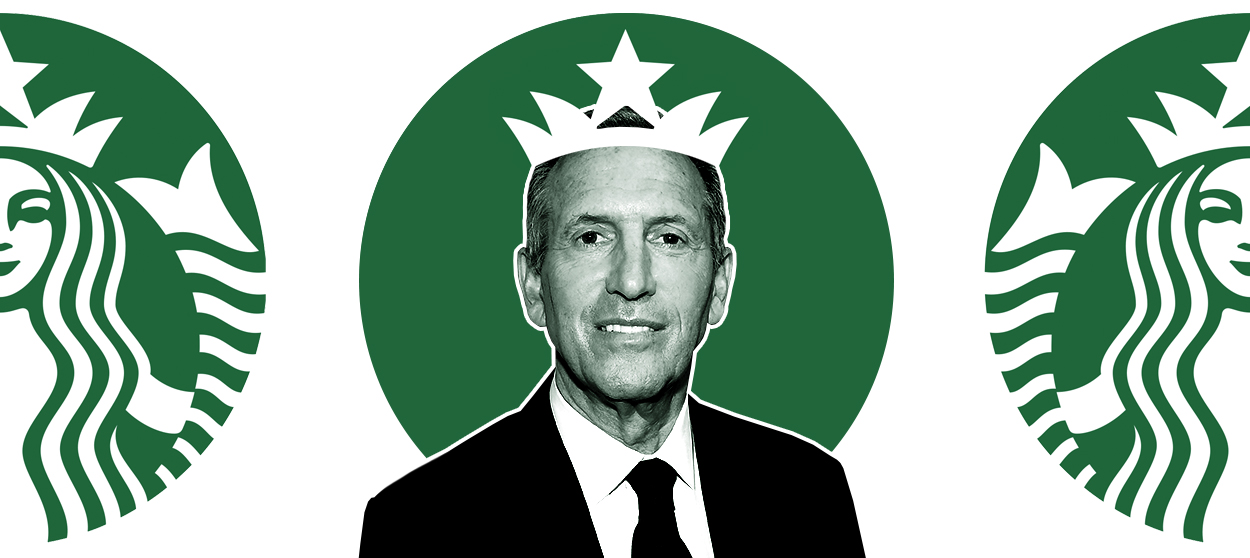The phony centrism of Howard Schultz
He's the candidate of the C-suite, not the center


A free daily email with the biggest news stories of the day – and the best features from TheWeek.com
You are now subscribed
Your newsletter sign-up was successful
No one is clamoring for billionaire Howard Schultz to run for president — at least outside of Davos, Switzerland.
Yet that hasn't stopped the former CEO of Starbucks from announcing that he's contemplating a run for president as an independent, or 60 Minutes from giving him several minutes of free media during which to make his case to the American people, or The New York Times from treating the bid seriously enough to warrant an article on Schultz's presidential ambitions.
It's hard to see why.
The Week
Escape your echo chamber. Get the facts behind the news, plus analysis from multiple perspectives.

Sign up for The Week's Free Newsletters
From our morning news briefing to a weekly Good News Newsletter, get the best of The Week delivered directly to your inbox.
From our morning news briefing to a weekly Good News Newsletter, get the best of The Week delivered directly to your inbox.
Or rather, the reason is obvious but so unpersuasive that it's hard to believe anyone could fall for it.
Schultz seems to believe, and seems to have convinced some very powerful people in the world of media, that he represents "the center" of the political spectrum — and that this supremely reasonable ideological position is on track to go underrepresented in the 2020 race for president because both parties have moved, by contrast, to the extreme left and right.
This is untrue. There is no reason at all why Schultz's preferred mix of policies should be considered "the center" of anything, and it's important that people understand why.
Centrism can be defined in one of two ways. Either it's a blending of distinct and seemingly antagonistic ideological views into a synthesis poised between them — or it means staking out an overlapping consensus in public opinion.
A free daily email with the biggest news stories of the day – and the best features from TheWeek.com
Neither describes Schultz. He's a Democrat who wants Democrats to be less ambitious, to trim their sails, to stop making policy promises premised on raising taxes on people like him.
That doesn't make him a centrist. It makes him a rich Democrat who opposes his fellow Democrats taking a bigger chunk of his income or wealth.
Of course he doesn't put it that way. Instead, he talks about prudence. About the danger of budget deficits. About the importance of Americans living within their means. The country simply can't afford universal health insurance or free college tuition — even though, somehow, such comparably wealthy countries as Canada, Denmark, France, and Germany manage to have something approaching one or both.
Why does the person who espouses this dour and plutocratic version of the Democratic Party platform get to be called a "centrist"? Why not reserve the term for someone who keeps everything else constant but runs as a pro-lifer? Or use it for someone like Hawaii Rep. Tulsi Gabbard, who is a fairly standard Democrat aside from her skepticism about American military adventurism?
The fact is that Schultz's positions aren't the center of anything. As the important Voter Study Group report from 2016 revealed, when voters are placed on a two-dimensional graph measuring liberal and conservative views on economics and culture, the quadrant that Schultz occupies — more conservative on economics and more liberal on social issues — is by far the least popular, despite being overrepresented in the upper ranks of business and finance.
The problem isn't Schultz's alone. Indeed, the very salience of left and right is breaking down in our time, with voters in countries from Brazil to the U.K., Italy, and Hungary turning away from parties structured along the traditional spectrum in favor of a new cleavage between globalists-establishment elites and populist-nationalists of both the left and right. (In France, left-wing and right-wing "yellow vest" protesters sometimes clash in the street while also taking on their common enemy, the political establishment represented by French President Emmanuel Macron.)
On this still-emerging vertical spectrum, Schultz is far from any center, planted firmly in the camp of the elites, proposing policies that benefit mainly the wealthy.
He is the candidate of and for the C-suite.
A true centrist needs to position him- or herself in the center of public opinion. And what that amounts to is plain. A strong majority of Americans support sharply raising taxes on the wealthy. A plurality disapproves of the large corporate tax cut passed by the Republican Congress in 2017. A whopping 70 percent of the country — and even 52 percent of Republicans — support Medicare for all. More than half of the country wants to see abortion remain legally available (with that number dropping below a majority only late in pregnancy.) Fifty-seven percent of Americans (and 69 percent of military veterans) would support removing all troops from Afghanistan after 17 years of stalemate.
That is what the beginning of a centrist agenda looks like in 2019, which means it is reformist Democrats like Elizabeth Warren, Kamala Harris, and Alexandria Ocasio-Cortez who are closest to being the true centrists.
An ultra-rich corporate scaredy-cat like Howard Schultz merely stands for stasis. Somehow I doubt he'll end up picking up much support. Though it doesn't take all that much to serve as a spoiler.
Damon Linker is a senior correspondent at TheWeek.com. He is also a former contributing editor at The New Republic and the author of The Theocons and The Religious Test.
